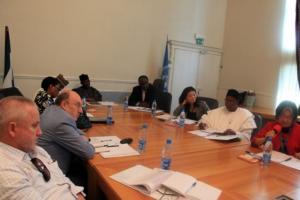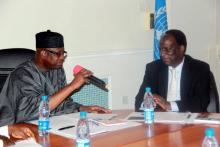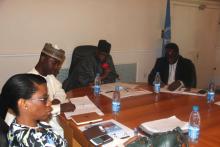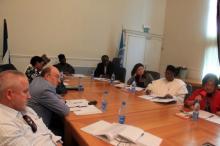WHO Briefs Development Partners on Polio
On Friday 29 June, 2012 -- World Health Organization Nigeria organized a polio briefing meeting for representatives of Development Partners in Abuja. The objectives of the meeting were to provide updates on the current polio situation globally, and in Nigeria; seek additional engagement and support from DPs for Nigeria’s intensified polio eradication efforts, and to identify any opportunities with ongoing humanitarian and/or other relevant development efforts.
Speaking at the meeting in Abuja, the UN Resident Coordinator/UNDP Resident Representative, Mr. Daouda Toure noted that Nigeria recorded a 95% decline in polio cases in 2010 compared to 2009, but this was not sustained in 2011 and there is now an upsurge of polio cases in 2012 especially in localized northern states of Nigeria.
Mr. Toure opined that partner agencies in the polio eradication programme should step up support to the ongoing intensified polio eradication efforts through targeted increased communication in various media and engagement of traditional leaders.
He commended the efforts of the Federal Government of Nigeria, Northern Traditional Leaders led by the Sultan of Sokoto as well as the international philanthropist, Mr. Bill Gates.
The Resident Coordinator challenged Development Partners to pause and reflect on the following questions:
“Are we, development partners and UN, doing all that we could to support Nigeria in this historic effort? Can we all re-strategize and rethink our approaches? Are there opportunities and /or institutional competencies that could better be built upon to help Nigeria achieve this goal?”
The World Health Organization Representative in Nigeria, Dr. David Okello stated that with 78 cases reported globally in June 2012, the world reached the lowest record of polio cases ever; and the bulk of these cases (58%) are from Nigeria alone.
Dr. Okello also observed that there is some evidence of improving quality and coverage of immunization campaigns in recent months, but the e rate of improvement has to be dramatically increased if Nigeria is to achieve interruption of poliovirus transmission in the near future.
He identified the following challenges facing the PEI programme in Nigeria:
Significant number of susceptible children in northern states not being reached by vaccination teams during campaigns or routine immunization.
Persistent rumors/misconceptions about vaccine safety
Increasing insecurity in polio-affected states
Funding gap crisis
In his presentation at the meeting, the Executive Director, National Primary Health Care Development Agency, Dr. Ado Jinadu Muhammed identified the current challenges facing PEI in Nigeria as continuing cases of missed children and Non-compliance situation, security challenges in some Northern States (Borno, Yobe, Kano, Kaduna), and poor Local Government Area (LGA) level commitment and accountability among others.
A number of important suggestions were made to intensify polio eradication efforts in the country. These were:
Put more efforts and emphasis on advocacy and social mobilization as a way of addressing the negative rumors/misconceptions about polio vaccines, and to help reach the chronically missed children.
Strengthen Government leadership at the local level, and ensure accountability of local leaders and communities in high risk areas.
Ensure continuity of PEI business even in the most security challenged areas in the north - through use of local expertise and CSOs.
Develop concrete activities for "in between periods" of immunization campaigns.
Pay attention to other parts of the country which do not presently have polio, but have poor routine immunization coverage. These areas have significant gaps in population immunity and are at risk of new polio outbreaks.






